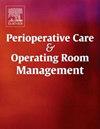Preoperative Fasting Time and Factorrs Affecting Adherence to Preoperative Fasting Time Among Adult Patient Undergoing Elective Surgery at Siant Paul's Hospital Millennium Medical College, Adis Ababa Ethiopia
IF 1
Q2 Nursing
Perioperative Care and Operating Room Management
Pub Date : 2025-01-22
DOI:10.1016/j.pcorm.2025.100470
引用次数: 0
Abstract
Introduction
Preoperative fasting is a time-tested professional practice that is undertaken for physiological and precautionary benefits to patients globally. Adherence to preoperative fasting guidelines is crucial for ensuring patient safety and minimizing complications during surgical procedures.
Objective
This study aimed to assess preoperative fasting times and factors affecting adherence to fasting guidelines among adult patients undergoing elective surgery at St. Paul's Hospital Millennium Medical College.
Methods
A cross-sectional study involving 277 patients who underwent elective surgery at St. Paul Hospital Millennium Medical College was conducted. A stratified sampling technique was used to assign samples for each stratum (type of surgery), and a systematic random sampling technique was used to select participants from each stratum. Data on sociodemographic and clinical characteristics, preoperative fasting instructions, knowledge, and actual fasting times were collected via a structured questionnaire. Descriptive statistics and logistic regression analyses were performed to identify factors associated with adherence to fasting guidelines. Statistical significance of P < 0.25 for bivariate regression and P < 0.05 for multivariate regression were considered.
Results
Most patients fasted considerably longer than recommended, with mean fasting times of 9.76 ± 3.21 h for clear fluids, 10.84 ± 2.92 h for semisolids, and 11.92 ± 2.89 h for solids. Only 10.9 % of patients knew the importance of fasting before surgery, and 92.7 % did not receive information about why avoiding food and fluids was necessary. Factors significantly associated with poor adherence to fasting guidelines included being scheduled second or later for surgery (AOR: 5.199, 95 % CI: 1.412–19.143) and having no previous history of surgery (AOR: 8.746, 95 % CI: 2.462–31.072).
Conclusion
Prolonged preoperative fasting times and poor adherence to fasting guidelines were observed among the study participants. Patient education, standardized protocols, and multidisciplinary collaboration are recommended to improve adherence, enhance patient safety, and promote better anesthesia and surgical outcomes.
埃塞俄比亚亚的斯亚贝巴圣保罗医院千禧医学院择期手术成年患者的术前禁食时间及影响术前禁食时间的因素
术前禁食是一项久经考验的专业实践,为全球患者的生理和预防益处而进行。遵守术前禁食指南对于确保患者安全和减少手术过程中的并发症至关重要。目的本研究旨在评估圣保罗医院千禧医学院(St. Paul’s Hospital Millennium Medical College)择期手术的成年患者术前禁食时间及影响禁食指南依从性的因素。方法对在圣保罗医院千禧医学院择期手术的277例患者进行横断面研究。采用分层抽样技术为每个阶层(手术类型)分配样本,并采用系统随机抽样技术从每个阶层选择参与者。通过结构化问卷收集社会人口学和临床特征、术前禁食说明、知识和实际禁食时间的数据。进行描述性统计和逻辑回归分析,以确定与遵守禁食指南相关的因素。P <的统计学意义;双变量回归和P <为0.25;多变量回归考虑0.05。结果大多数患者禁食时间明显长于推荐时间,清液体平均禁食时间为9.76±3.21 h,半固体平均禁食时间为10.84±2.92 h,固体平均禁食时间为11.92±2.89 h。只有10.9%的患者知道术前禁食的重要性,92.7%的患者不知道为什么不进食和喝水是必要的。不遵守禁食指南的显著相关因素包括第二次或更晚手术(AOR: 5.199, 95% CI: 1.412-19.143)和没有既往手术史(AOR: 8.746, 95% CI: 2.462-31.072)。结论术前禁食时间延长,对禁食指南的依从性较差。建议患者教育、标准化方案和多学科合作,以提高依从性、增强患者安全、促进更好的麻醉和手术结果。
本文章由计算机程序翻译,如有差异,请以英文原文为准。
求助全文
约1分钟内获得全文
求助全文
来源期刊

Perioperative Care and Operating Room Management
Nursing-Medical and Surgical Nursing
CiteScore
1.30
自引率
0.00%
发文量
52
审稿时长
56 days
期刊介绍:
The objective of this new online journal is to serve as a multidisciplinary, peer-reviewed source of information related to the administrative, economic, operational, safety, and quality aspects of the ambulatory and in-patient operating room and interventional procedural processes. The journal will provide high-quality information and research findings on operational and system-based approaches to ensure safe, coordinated, and high-value periprocedural care. With the current focus on value in health care it is essential that there is a venue for researchers to publish articles on quality improvement process initiatives, process flow modeling, information management, efficient design, cost improvement, use of novel technologies, and management.
 求助内容:
求助内容: 应助结果提醒方式:
应助结果提醒方式:


